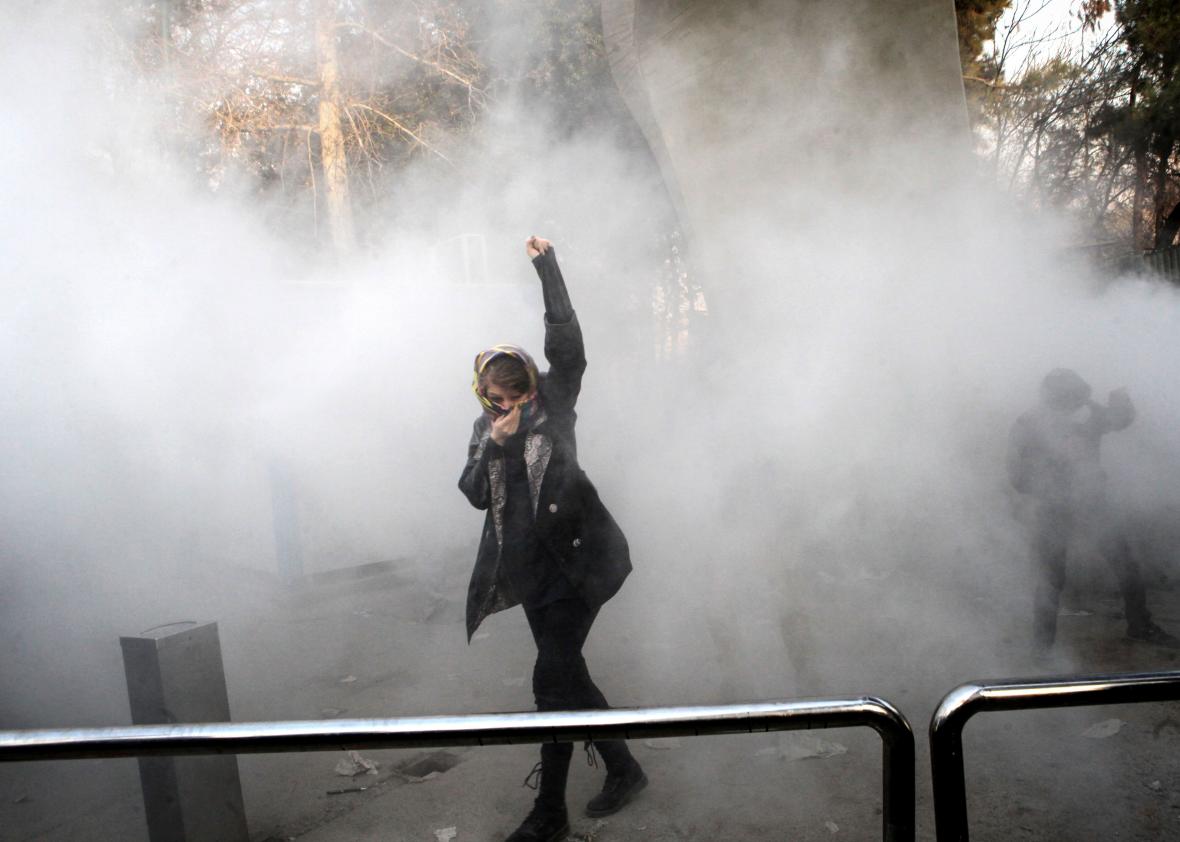Netizen Report: Iranian Authorities Blocking International Web Traffic, Messaging Platforms

STR/AFP/Getty Images
The Netizen Report offers an international snapshot of challenges, victories, and emerging trends in internet rights around the world. It originally appears each week on Global Voices Advocacy. Mahsa Alimardani, Ellery Roberts Biddle, Nevin Thompson, Mohamed ElGohary, James Losey, Vishal Manve, Talal Raza, Juke Carolina Rumuat, and Sarah Myers West contributed to this report.
Amid the powerful wave of public protests that have taken place across Iran over the past week, authorities are clamping down on communication and information sharing over platforms like Telegram and Instagram.
On Jan. 2, sources who work at Iran’s internet exchange point told the Center for Human Rights in Iran that the government ordered them to disrupt access to international traffic by bumping every other international data packet off their network. This means that international data cannot be consistently accessed in Iran.
Restrictions have been on the rise since Dec. 28, when protests broke out in the northeastern city of Mashhad over unemployment, rising food prices, and charges of wrongdoing directed at both reformist and conservative government leaders. The demonstrations quickly spread to smaller towns and major cities. On Dec. 31, the Islamic Republic of Iran Broadcasting service announced that authorities had “temporarily” suspended Telegram and Instagram “to preserve the peace and security of citizens.” This is a serious move in Iran, where other large-scale platforms like Facebook and Twitter have been blocked since the 2009 Green Movement protests.
The blocking of Telegram has brought especially severe consequences, as the mobile messaging app has become ubiquitous among web users. Of the 45 million Iranians who are online, 40 million use Telegram for everything from staying in touch with family and friends to reading news and keeping up on public events—including protests. The effects of this type of censorship are far-reaching. As protests have turned violent in some cities—state media have reported that 21 people have been killed in the clashes—open communication channels become increasingly important to maintaining public safety.
Users are also struggling to access digital censorship circumvention tools, due to what appear to be technical blocks on their websites. Internet infrastructure companies like Digital Ocean—which hosts circumvention tools, including Lantern, have also experienced disruptions.
Despite these restrictions, Iranians are still using the internet to report and document what they’re experiencing. In a video attributed to Bandar Abbas, protesters set fire to a billboard with the image of Iran’s Supreme Leader, Ali Khamanei. Global Voices author and immigration lawyer Hamid Yazdan Panah described this as “an act of rage and defiance that goes beyond the price of eggs or the desire for political reform.”
DRC sees internet shutdown ahead of protests
On Dec. 30, authorities in the Democratic Republic of Congo ordered telecommunications providers to block internet access and SMS messaging ahead of protests that took place in multiple cities the following day. Demonstrators, many of whom were organized within church groups, are demanding that DRC President Joseph Kabila end his bid to change constitutional term limits on the presidency.
Personal data for sale in India, thanks to Aadhaar
In an attempt to investigate the security of personal data held within India’s massive national ID system, Aadhaar, reporters at the Tribune of India were able to gain “unrestricted access to details for any of the more than 1 billion Aadhaar numbers created in India thus far,” simply by responding to an advertisement circulated via WhatsApp and paying the anonymous poster about $7.90. India’s Unique Identification Authority says the Tribune had “misreported” the story. Read the Tribune’s response here.
Pakistan’s cybercrime law will soon cover blasphemy online
The Federal Cabinet of Pakistan approved an amendment to the country’s 2016 Prevention of Electronic Crimes Act, extending the law to address expressions of blasphemy and pornography on the internet. These will now be included as criminal offenses under the law and could pave the way for criminal charges against anyone who posts social media content that could be interpreted as blasphemous.
Spying on us? Not so fast, says German court
On Dec. 13, 2017, the Federal Administrative Court in Leipzig, Germany, ruled in favor of a complaint filed by Reporters Without Borders against Germany’s foreign intelligence agency, BND. The decision stipulates that the BND may not store metadata, such as phone numbers and the time and date of a call, for international calls, for the purposes of intelligence analysis. This should have a big impact on BND, which, according to a series of documents leaked to Zeit Online in 2015, collects an average of 220 billion pieces of metadata each day.
Germany starts enforcing “Netz DG” hate speech law
The start of 2018 marks the start of full enforcement of Germany’s controversial Netzwerkdurchsetzungsgesetz anti-hate speech law, called the NetzDG for short. Under the law, social media companies must respond to government requests to remove illegal content—including hate speech and so-called fake news—within 24 hours of receipt. Companies will have up to seven days to consider the removal of more ambiguous material. Facebook, Twitter, and Google/YouTube will be the primary targets of the law’s implementation.
Germany’s criminal code already defines hate speech, so the law does not create new measures or definitions. Instead, it forces companies to police hate speech or face astronomical fines. The law is unprecedented at the global level, and could have game-changing ripple effects worldwide.
New research
“Occasionally by Decree: Update on the Blocking of Websites in Egypt”—Association for Freedom of Thought and Expression in Egypt
“New Broadband Pricing Data: What does it cost to purchase 1GB of mobile data?”—Alliance for Affordable Internet
Future Tense is a partnership of Slate, New America, and Arizona State University.

